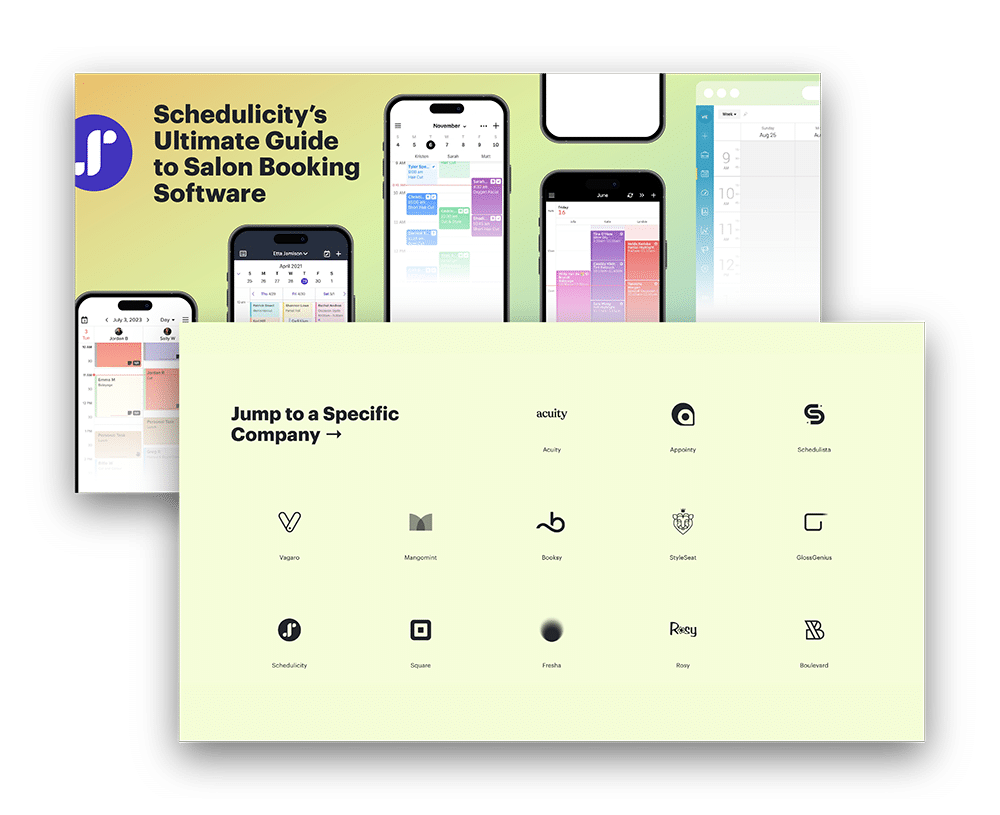What’s the difference between booth rental and commission-based salons?
Which one is right for you?
If you’re a new stylist starting your hair career, you’re probably considering renting a booth in a salon or working for a commission-based salon.
Both have their pros and cons, and it’s important to understand the difference before making a decision.
We’ll explore the differences between booth rental salons and commission-based hair salons, helping you choose the best option for your career.
Got specific questions? Feel free to jump ahead. 👇
- What Is a Booth Rental Salon?
- What Is a Commission-Based Salon?
- Is Booth Rental or Commission-Based Better?
- Percentage Rent: Can I Rent a Booth and Earn Commission?
Booth Rental Salon vs Commission-Based Salon: A Breakdown
What Is a Booth Rental Salon?
A booth rental at a hair salon, as the name suggests, allows individual stylists to rent a booth within a salon and operate as independent contractors.
Stylists renting a booth (or a “chair”) at a hair salon are essentially running their own mini salon business within the larger salon.
Stylists who rent a chair decide who sits in it and when.
Advantages of Booth Rental Salons
Freedom and Flexibility: Renting a booth grants hair stylists the freedom to set their own schedule, choose their own clients, and establish their own salon pricing structure.
You can even choose which hair products to use as a booth renter.
This level of career independence allows stylists to express their creativity and individuality.
It also means stylists can have a better work-life balance by setting their own schedule.
Potential Increased Earnings: It’s called pricing power. Booth rental stylists have the potential to earn more money compared to those working on commission, because they set their own prices.
Stylists who rent a booth also manage their own clientele, and they can sell products they love. (Who doesn’t love a little upsell?)
Plus, you can bundle services into package deals and/or offer promotions.
Pricing power means stylists renting a booth typically earn more revenue than commission-based stylists.
Business Management Experience: Renting a salon booth offers a unique career opportunity to gain valuable entrepreneurial skills.
By managing their own hair business within the salon, hair stylists often learn how to:
- Handle finances and bookkeeping
- Market a salon and develop a personal brand
- Implement salon client retention strategies
- Adjust pricing strategies and service lists
- Communicate with clients professionally
However, booth rental salons are not without their drawbacks… 👇
Disadvantages of Booth Rental Salons
Overhead Costs: If you rent a booth, you have to pay monthly fees to the larger salon. These fees can vary depending on the salon’s location and reputation.
(If the salon is more luxurious and city-centric, the fees will likely be higher for renters.)
Additionally, booth renters need to invest in their own salon equipment and supplies, such as styling tools and products.
Rent, insurance, business licenses, payment processing fees, retail sales certificates, inventory – all depend on you as a salon booth renter.
So do taxes. As a booth renter, you have to account for taxes at the end of the year.
They’re not automatically taken out of your paycheck, because you’re not a salon employee.
(It’s best to track business expenses throughout the year and pay quarterly tax estimates, so you’re not hit with a big tax bill in April.)
Client Acquisition: Commission-based salons provide a steady flow of clients. However, booth rental stylists are responsible for attracting and retaining their own customers.
This requires effective salon marketing and networking skills to build a solid client base.
Lack of Salon Management Support: Sometimes, the people who own a salon were never stylists. They just own the building.
That means, at some booth rental salons, anything that happens in your chair (including client complaints, refunds, bad reviews) is your responsibility.
You might not get support from a manager in tricky situations.
💡 Pro Tip: Don’t miss Schedulicity’s Guide to Salon Booth Rentals for New Hair Stylists: How Does Booth Rental Work? A Free Guide.
What Is a Commission-Based Salon?
Commission-based salons follow a totally different business model than booth rental hair salons.
Instead of working independently and paying rent for a booth or a chair, stylists in commission-based salons are employees of the salon.
This means they receive a percentage of each hair service they provide.
Advantages of Commission-Based Salons
Minimal Financial Risk: At booth rental salon, stylists bear the costs of running their business.
However, hair stylists who work on commission avoid the larger salon startup expenses associated with equipment and supplies.
The salon also handles administrative tasks, like taxes, scheduling, and inventory.
Plus, you’ll always make minimum wage at a commission-based salon.
You might even get benefits being a salon employee, like salon education stipends, health insurance, and company-matched retirement savings plans.
Built-in Clientele: Commission-based salons often have an existing customer base.
This means commission-based hair stylists can hit the ground running from day one. They can focus on honing their behind-the-chair skills rather than worrying about attracting new clients.
Team Atmosphere: Working in a commission salon creates a sense of camaraderie among stylists.
Collaboration, learning from peers, and having the support of the salon management can help new hair stylists grow their skills and confidence.
(Plus, support from other hair stylists and a salon manager is a great way to combat hustle culture in a busy salon environment.)

Ultimate Guide to Salon Booking Software
In this guide, we’ll share a comprehensive breakdown of the best booking apps for salons — to help make your research a little easier.
View the GuideDisadvantages of Commission-Based Salons
Limited Control: Stylists in commission-based salons have less control over their:
- Work environment, including dress code and management style
- Pricing
- Schedule
- Client list
- Products
Their earning potential is determined by the salon’s policies, which can lead to income limitations.
Stylists working for commission are usually paid flat-rate commissions or a percentage of services rendered – even if they upsell products.
The only real opportunity commission-based stylists have to make more money is through earning tips.
(Even that depends on the salon’s policies, though. Some salons don’t allow tipping anymore.)
Client Competition: Within a commission salon, hair stylists may find themselves competing for clients with their colleagues.
This can result in:
- Reduced job security
- A lack of continuity and impersonal relationships with clients
- Less income
- An unhealthy sense of competition between co-workers
- Inconsistent appointments
So… Is Booth Rental or Commission-Based Better for You?
Should you go with a booth rental or commission-based salon?
The answer depends on individual career goals, preferences, and circumstances.
We know, we know…
That might not be the answer you’re hoping for. 😊
But! A big decision like this really does depend on your own career goals and preferred work environment:
- Do you want to work for yourself? Is gaining experience under someone else’s management OK?
- What’s most important to you at this stage of your career? Is it a steadier income? Practicing your skills?
- Are you ready to take on the responsibilities of managing a business, like bookkeeping, marketing, and scheduling? (If so, we have a helpful booking app for stylists. 😉)
If you value stability over entrepreneurship, a commission-based salon might be a good fit.
If you want total control over your business and the potential to make more money, renting a booth might be right for you.
Can I Do Both: Rent a Chair and Work on Commission?
This model is often called percentage rent. It’s rare, but it does exist!
Percentage rent means you negotiate a lower booth rent and earn a smaller commission for services rendered.
It can provide financial stability – thanks to the commission structure – and more autonomy in business decisions, like a booth rental.
Plus, percentage rent provides the opportunity to earn more revenue than traditional commission-based models.
With all these models, it’s best to weigh the pros and cons before making a decision.
Plus, you can always go back and forth between commission and rental or try a hybrid model to see which you prefer.
Remember: As long as you take the time to evaluate your long-term goals and current financial situation, you’ll be ready to make the best decision you can.
Hey! Are you an hair stylist, esthetician, or nail tech on the hunt for an online scheduling app? Schedulicity has you covered!
With appointment scheduling, marketing tools, and payment processing, you have everything you need to run your business — all in one place!






